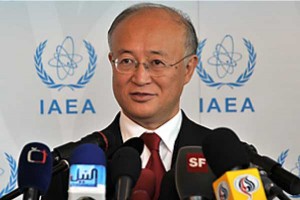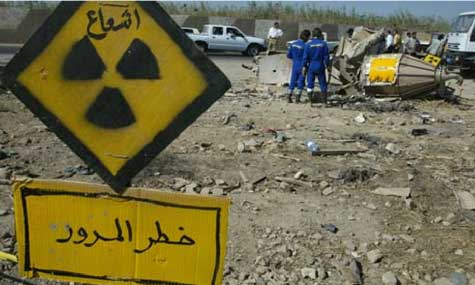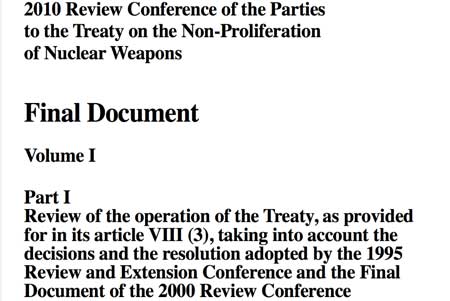10/29/2010 –

Yukiya Amano, the director general of the International Atomic Energy Agency (IAEA), faces a major challenge in seeking to prevent further nuclear proliferation in the Middle East. In addition to the longstanding dispute over Iran’s nuclear activities, he has to address Arab concerns about Israel’s irregular status within the Nuclear Nonproliferation Treaty (NPT). During his two-day trip to Israel, the first by an IAEA director since 2004, he met with the head of the Israeli Atomic Energy Commission, Shaul Chorev, who invited him to Israel. He is also met with other senior Israeli national security officials. One issue likely discussed during Amano’s visit is the effort by many Arab countries, supported by other governments, to pressure Israel to be more transparent about its nuclear activities and join the NPT.
The NPT permits only those five countries that possessed nuclear weapons at the time of the treaty’s entry into force in 1970—Britain, China, France, Russia and the United States—to retain nuclear weapons for an indefinite transitional period while they reduce and eventually eliminate their nuclear arsenals. All other treaty parties agree to allow the IAEA to monitor their nuclear programs and safeguard their nuclear material to verify that they do not have covert nuclear weapons programs. Israel has never publicly confirmed or denied its nuclear status or revealed its possession of a nuclear weapon by openly testing one. Israelis believe that this policy of nuclear ambiguity allows their country to enjoy the deterrence benefits of nuclear possession without needlessly provoking neighboring countries into seeking their own nuclear deterrents. Successive Israeli governments have always declined to ratify the NPT because Israel would need to declare and relinquish its nuclear arsenal to meet its requirements.
The 1995 NPT Review Conference (RevCon) adopted a “Resolution on the Middle East” that called for making “utmost efforts” to establish a zone free of weapons of mass destruction in that region. Its adoption was part of a package deal that also saw the RevCon extend the NPT indefinitely and the five nuclear weapons states commit to accelerate their nuclear disarmament and facilitate developing countries’ access to peaceful nuclear technologies.
The lack of progress in implementing the resolution became the most divisive issue at the May 2010 RevCon. Under the chairmanship of Egypt, the 118-member nonaligned movement, including Iraq, sought to press the RevCon to adopt a specific plan for holding a conference dedicated to bringing the resolution into effect. The 2010 RevCon Final Declaration calls for convening a dedicated Middle East conference in 2012 on creating a WMD-free zone in that region, but U.S. and Israeli diplomats sought but failed to remove the explicit reference to Israel in the text, which calls on Israel to join the NPT and subject itself to IAEA inspections. In the end, the Obama administration decided not block adoption of the final declaration over the issue. Nonetheless, U.S. officials, including President Obama, have said they will not support convening the conference if it looks like Israel will be singled out at the meeting.
Iraq will be an important player in these efforts to prevent further nuclear proliferation in the Middle East. Iraq signed the NPT on July 1, 1968, and ratified it on October 29, 1969. Article 9(e) of the new Iraqi constitution states that the Iraqi government shall: “Respect and implement Iraq’s international obligations regarding the non-proliferation, non-development, non-production, and non-use of nuclear, chemical, and biological weapons, and shall prohibit associated equipment, materiel, technologies, and delivery systems for use in the development, manufacture, production, and use of such weapons.” The post-Saddam Iraqi government has taken a cooperative stance regarding the nuclear nonproliferation regime, including by signing the Comprehensive Nuclear Test Ban Treaty in August 2008. That same year, Iraq signed the IAEA Additional Protocol, which gives the IAEA enhanced inspection rights. As of July 2010, the Iraqi parliament has yet to ratify either agreement. Pending legislative approval, the Iraq government has informed the IAEA that it will implement the Additional Protocol on a voluntary basis. Iran originally followed the same policy, but soon ceased respecting the Protocol after the IAEA continued to uncover suspicious evidence about Tehran’s nuclear program.
Credit Image: http://www.un.org
In 2009, Iraq announced an interest in developing a peaceful civilian nuclear program. The Minister of Science and Technology cited both research and the growing demand for electricity as reasons Iraq is exploring the feasibility of nuclear technology. Iraq cannot legally pursue a civil nuclear program until the UNSC lifts the Saddam-era restrictions on its nuclear activities specified in resolutions 687 (1991) and 707 (1991). In October 2009, the Iraqi government lobbied the UN and IAEA for approval to restart a nuclear energy program. It argued that a reactor would be used for research purposes only, and it would pursue nuclear energy to update the country’s antiquated electricity networks and infrastructure. Iraqi officials also cite economic reasons for seeking to rekindle its nuclear program, citing nuclear research’s many uses in medicine, industry and agriculture.
Many Iraqi officials and scientists, including Iraq’s Oil Ministry, support shifting the focus from the country’s diminishing oil reserves to alternative energy sources. All officials advocating a nuclear program pledge it would only be for peaceful purposes. However, with a civilian nuclear infrastructure in place, the amount of time it would take Iraq to develop a nuclear weapons program would be drastically reduced. In addition, the Iraq civil war from 2005-2007 convinced the IAEA that Iraq was too unstable for nuclear energy at that point.
However, Iraqi government officials remain vigilant in developing a nuclear energy program. In February 2010, Iraqi Electricity Minister Karim Wahid invited France to help Iraq build a nuclear power plant. France previously helped Iraq develop a nuclear energy program in the late 1970s and early 1980s. French President Nicolas Sarkozy made no promises in response to this request. In early 2010, the U.N. Security Council said it could eliminate sanctions on Iraqi nuclear energy work and other programs if Baghdad ratified the Additional Protocol to its nuclear inspections agreement with the International Atomic Energy Agency.
As a result of these restrictions, the present Iraqi government is also not pursuing a civil nuclear program of any significance. Most of Iraq’s capabilities at the time of the 1990 Gulf War subsequently deteriorated throughout years of international inspections, sanctions, and additional regional wars. Its remaining nuclear capabilities are limited to medical and agricultural applications. The Iraq government’s current nuclear efforts have been devoted to cleaning up the country’s radioactively contaminated sites.
Due to past military operations, lack of upkeep, and looting, Iraq now suffers from enormous radioactive waste problems, including destroyed nuclear facilities, uncharacterized radioactive wastes, liquid radioactive waste in underground tanks, wastes related to the production of yellow cake, sealed radioactive sources, and activated metals and contaminated metals that must be constantly guarded. Iraq has never had an authorized radioactive waste disposal facility.
As a result, ever increasing quantities of radioactive material must be held in guarded storage. Iraq currently lacks the trained personnel, regulatory and physical infrastructure to safely and securely manage these facilities and wastes. Following the 2003 invasion, the occupying powers did little to secure the sites and various nuclear facilities, including the Baghdad Nuclear Research Facility or the Tuwaitha Nuclear Research Centre located southeast of Baghdad.
In June 2003, the IAEA reported that tons of uranium, as well as other radioactive materials such as thorium, had been recovered, and that the vast majority had remained on site. There were several reports of radiation sickness in the area as looters, potentially unaware of the facility’s purpose, emptied containers they had stolen and replaced radioactive materials with water, milk, and other items.
 A danger sign outside the Tuwaitha nuclear facility, south of Baghdad.
A danger sign outside the Tuwaitha nuclear facility, south of Baghdad.
The site was looted following the 2003 invasion of Iraq.
Credit Photo: http://www.guardian.co.uk
In June 2004, the United States transferred control of all the facilities to the new Iraqi government. Shortly before this transfer of sovereignty to the Iraqi government, the United States removed approximately 600 tons of low-enriched uranium formerly-stored at the Tuwaitha facility. Thanks to the U.S. and IAEA, all of Iraq’s fresh highly enriched nuclear fuel, spent nuclear fuel, low-enriched uranium, and yellowcake have been removed from the country, along with approximately 1,000 radioactive sealed sources.
Still, Al-Tuwaitha is in urgent need of final decommissioning, dismantlement, and site remediation. The sites that previously housed Iraq’s nuclear facilities remain in a radioactively-contaminated and hazardous condition. In July 2008, the U.S. State Department began the Iraqi Nuclear Facility Dismantlement and Disposal Program, which is assisting Iraq in dismantling and disposing radioactively contaminated materials leftover from Saddam’s nuclear program, with special emphasis on cleaning up the Al-Tuwaitha nuclear complex.
In his May 5 speech to the 2010 NPT Review Conference, Ambassador Mohammed Al-Humaimidi said that his government “is striving to create a world free of nuclear weapons and supports all efforts in this area, and it considers the 2010 Review Conference to be an important step to nuclear non-proliferation at the international level.” He welcomed the convening of the April 2010 Nuclear Security Summit and the signing of the new START agreement between Russia and the United States. He noted that his government has “affirmed that it will be free of Weapons of Mass Destruction and of the means of their delivery, and has confirmed its commitment to the conventions and treaties on disarmament and non-proliferation following the harsh experience of the Iraqi people due to the policies of the former regime.”
In this regard, Ambassador Al-Humaimidi said his government was ‘exerting its efforts with the Security Council to review the remaining restrictions previously imposed on Iraq in the area of disarmament, under the relevant Security Council resolutions, especially Resolutions 687 and 707 (1991).” He insisted that ‘Iraq has fulfilled all its obligations under Security Council resolutions relating to disarmament which led to Security Council resolution 1762 (2007) terminating the mandate of the United Nations Monitoring, Verification and Inspection Commission (UNMOVIC) and the special team of IAEA in Iraq.” Removing these restrictions, he argued, was important because they prevented his people from “benefiting from scientific and technological progress which limit Iraq’s potential to be an active member of the International community and Iraq’s right to benefit from this progress based on the statute of the IAEA.” He called for implementation of the 1995 resolution on the Middle East, which necessitates Israel’s adherence to the NPT as a non-nuclear weapon state.
Unlike many of the other nonaligned countries, Ambassador Al-Humaimidi expressed greater concern about the risks of nuclear terrorism, about how the guaranteed right of all NPT-member States to engage in peaceful nuclear activities must be constrained by the inherent dual-use nature of nuclear technologies, about the potential value of establishing a nuclear fuel bank to reduce the need for national enrichment programs, and how “transparency and cooperation with the IAEA, the application of the safeguards system, and other relevant measures must be emphasized in addition to respect of international conventions.”
Under its new government, Iraq might be in a pivotal position to help bridge the gap between the IAEA, Iran, and Israel—providing it receives appropriate assistance and support from Washington despite the ongoing U.S. military withdrawal from that country.


